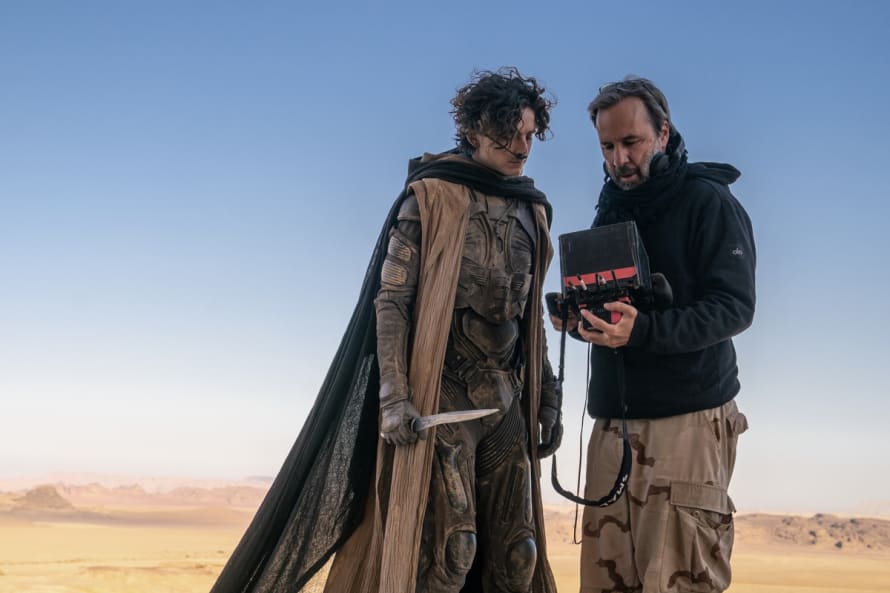Speaking with Denis Villeneuve the day after Dune: Part Two's Montreal premiere where the red carpet was quite literally rolled out for him, I find the filmmaker in a pensive mood. Slightly road-worn from the around-the-world press tour he and his cast have been on for the past few months, Villeneuve seems to be in an introspective state, perhaps encouraged by his return home to family and friends.
"It was very nice to share the movie with folks at home," Villeneuve says with a soft smile. After the screening, a small reception was held, which the director likened to a wedding, "Everybody comes in the room and starts to drink. You talk for 30 seconds there, 30 seconds here — there were too many people that I wanted to talk with."
There's a deserved amount of pride for Denis Villeneuve in Quebec and the rest of the country. After nearly 30 years, Villeneuve has earned his spot as one of the country's all-time auteurs, with a cinematic batting average that rivals any of the great filmmakers past and present. And while it'd be incorrect to consider Villeneuve's Dune films as the culmination of an extraordinary career, there's the sense that these movies denote the end (or beginning) of a particular phase in his filmography.
While making the rounds for Dune: Part One three years ago, Villeneuve's love for Frank Herbert's sci-fi classic was readily apparent. A novel that he read in his youth and captured his imagination, Villeneuve describes the book today as "magical" and still having "that vivid, unique quality that I really loved when I first [read it]."
Part One would go on to experience success by every metric, winning numerous accolades, including six Academy Awards (although Villeneuve was curiously left off the list of Best Director nominations); grossing over $400 million worldwide despite being caught under Warner Bros.'s now-infamous day-and-date release strategy of 2021; and receiving overwhelming positive reviews from critics, including a spot on Exclaim!'s year-end list.
The two notable criticims that arose out of Part One concerned the film not feeling like a complete story and a distinct lack of Zendaya, in spite of her substantial presence in the movie's marketing run up. In more ways than one, Villeneuve acknowledges the former, noting that Part Two isn't so much a sequel as it is a continuation of Part One, both films needed in tandem to tell the story of Dune.
As for Zendaya's Chani, who only appears in a non-dream state in the final 20 minutes of the first film, Villeneuve always had a plan for her from the start. "I needed Chani to have distance from Paul Atreides [for audiences] to understand that Paul is not a hero. He betrays people he loves," says Villeneuve, explaining how his treatment of the character differs from Herbert's book. "In order to do that, I needed to have her point of view. It's true that, in the book, the character disappears, and I thought that was a lost opportunity."
He continues, "The tragedy of Paul and Chani's love story, that's something that I don't think was shown in the book. In my adaptation, I tried to be more faithful to Frank Herbert than the book."
In this way, Villeneuve exemplifies his deep understanding of Herbert and Dune as a piece of literary work and commentary. Herbert was unhappy that readers took his words as a celebration of Paul as a hero rather than a warning against charismatic messianic figures, and Villeneuve points out that Herbert wrote 1969's Dune Messiah as an epilogue of sorts to course correct public perception. Through these films, Villeneuve aims to uphold Herbert's intention and spirit with Chani as his guiding compass.
As we patiently wait for Part Three — which would presumably conclude Villeneuve's Dune trilogy and cover the events of Messiah — to be given the official go-ahead, it's tempting to think that maybe the successful realization of a childhood dream mixed with his most recent homecoming reception would spur a desire for the filmmaker to make a return to the quiet indies that started his career.
"It might happen. Right now, I have the stamina to do movies that require more energy. In 20 years, if I'm still directing, it might be possible to only make more intimate projects," he reflects. "I don't know. It's difficult to talk about the future. Of course, I'll probably come back here one day, but not now."
The only thing holding back one of the country's greatest cinematic exports from returning to the Canadian film industry proper?
"I have a few projects that I would love to bring [to the light of day] and they cannot be done here. They require too much firepower," Villeneuve says with a laugh.




